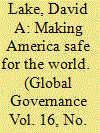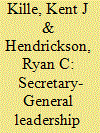|
|
|
Sort Order |
|
|
|
Items / Page
|
|
|
|
|
|
|
| Srl | Item |
| 1 |
ID:
099861


|
|
|
|
|
| Publication |
2010.
|
| Summary/Abstract |
Over the past century, the United States has built and sustained relationships of varying hierarchy over states in Latin America, Western Europe, and Northeast Asia. In recent decades, it also has attempted to expand its authority over other states into Eastern Europe, which has been met with a measure of success, and the Middle East, which has been far more problematic. The authority wielded by the United States over its subordinates, despite occasional abuses, provides security both internally and externally and permits unprecedented prosperity. Americans, in turn, gain from writing the rules of that order. The key foreign policy task today is not to diminish US authority, but to preserve its benefits into the future. To rule legitimately, however, requires tying the suzerain's hands. To secure the international order that has been so beneficial in the past century and to succeed in extending that order to countries that do not yet enjoy its fruits requires a new, more restraining, multilateral solution that binds the hands of the United States far more tightly than in the past.
|
|
|
|
|
|
|
|
|
|
|
|
|
|
|
|
| 2 |
ID:
099860


|
|
|
|
|
| Publication |
2010.
|
| Summary/Abstract |
The International Criminal Court is a new mechanism for the global governance of human rights that enjoys broad support from a large number of states. The United States expressed its hostile opposition especially in the early years, claiming that the ICC was harmful to US national interests. This attitude toward the court changed over the years, and a more pragmatic approach toward the ICC is now discernible. The United States had to acknowledge that actions taken in opposition to the ICC began to be harmful to its own national interests and it also realized the national interest utility the court has despite the deep-seated opposition to the concept of supranational sovereignty. This article looks at the reasons for opposition by the United States, its initial hostile position, and changes in the US approach toward the ICC.
|
|
|
|
|
|
|
|
|
|
|
|
|
|
|
|
| 3 |
ID:
099863


|
|
|
|
|
| Publication |
2010.
|
| Summary/Abstract |
The UN and NATO have been jointly engaged in a range of conflicts in the post-Cold War era. Studies of these organizations, however, have largely overlooked the institutional interplay between their Secretaries-General. After brief reviews of the relationship between the UN and NATO and the leadership role that a Secretary-General can provide, this article examines the political relationship between Kofi Annan and Javier Solana across three stages of NATO's 1999 Operation Allied Force in Kosovo. The findings show the important roles played and coordinated effort supplied by the Secretaries-General. This provides new perspectives on UN-NATO institutional coordination and has important implications for considering the relative security roles to be played by the UN and NATO in the future.
|
|
|
|
|
|
|
|
|
|
|
|
|
|
|
|
| 4 |
ID:
099862


|
|
|
|
|
| Publication |
2010.
|
| Summary/Abstract |
Since the end of the Cold War, relations between the United States and the UN have oscillated between periods of friendship and friction. What accounts for the major changes in US-UN relations, especially in the realm of multilateral peace operations? This article argues that the two most significant turning points have come after the unexpected deaths of Americans: first, in Somalia when the William J. Clinton administration moved away from multilateral cooperation in UN peace operations, and, second, in the wake of the 9/11 attacks that served to drive the George W. Bush administration in the other direction, toward the UN. In both instances, the administrations changed their positions from staunch multilateralism or unilateralism toward moderation. Under the Barack Obama administration, we can likely expect a continuation of moderate multilateralism.
|
|
|
|
|
|
|
|
|
|
|
|
|
|
|
|
| 5 |
ID:
099864


|
|
|
|
|
| Publication |
2010.
|
| Summary/Abstract |
To what extent does empirical evidence confirm or question the value of conflict early warning and response for effective practice by regional organizations? This article presents a brief overview of existing key EWR mechanisms and analyzes if, and under what conditions, these mechanisms might be a useful peace and security promotion tool for regional organizations. It looks at three regional and subregional organizations-the African Union, the Economic Community of West African States/Economic Community of West African States Monitoring Group in West Africa, and the Intergovernmental Authority on Development in East Africa that have established such conflict EWR mechanisms. Until now, these tools have not been adequately implemented or fully used. The principal reason for this is not a lack of sufficient EWR data. Instead, regional organizations often fail to respond in time to prevent an emerging violent conflict because of weaknesses of the organization and political disagreements within the organization.
|
|
|
|
|
|
|
|
|
|
|
|
|
|
|
|
|
|
|
|
|